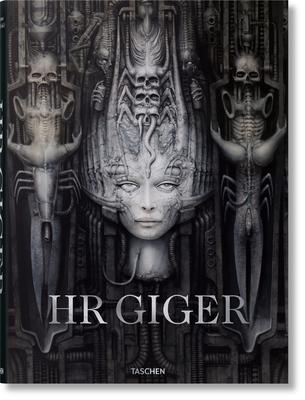"At its essence, Giger's art digs down into our psyches and touches our very deepest primal instincts and fears. His art stands in a category of its own. The proof of this lies in the intensity of his work and imagination, which I can only compare to Hieronymus Bosch and Francis Bacon in their powers to provoke and disturb." - Ridley Scott
Swiss artist HR Giger (1940-2014) is most famous for his creation of the space monster in Ridley Scott's 1979 horror sci-fi film Alien, which earned him an Oscar. In retrospect, this was just one of the most popular expressions of Giger's biomechanical arsenal of creatures, which consistently merged hybrids of human and machine into images of haunting power and dark psychedelia. The visions drew on demons of the past, as well as evoking mythologies for the future. Above all, they gave expression to the collective fears and fantasies of his age: fear of the atom, of pollution and wasted resources, and of a future in which our bodies depend on machines for survival.
This book was begun shortly before the artist's untimely death and shows the complete story of Giger's life and art, his sculptures, film work, and iconic album covers as well as the heritage he left us in his own artist's museum and self-designed bar in the Swiss Alps. In an in-depth essay, Giger scholar Andreas J. Hirsch plunges into the themes of Giger's oeuvre and world while an extensive artist biography draws on contemporary quotes and Giger's own writings.

"At its essence, Giger's art digs down into our psyches and touches our very deepest primal instincts and fears. His art stands in a category of its own. The proof of this lies in the intensity of his work and imagination, which I can only compare to Hieronymus Bosch and Francis Bacon in their powers to provoke and disturb." - Ridley Scott
Swiss artist HR Giger (1940-2014) is most famous for his creation of the space monster in Ridley Scott's 1979 horror sci-fi film Alien, which earned him an Oscar. In retrospect, this was just one of the most popular expressions of Giger's biomechanical arsenal of creatures, which consistently merged hybrids of human and machine into images of haunting power and dark psychedelia. The visions drew on demons of the past, as well as evoking mythologies for the future. Above all, they gave expression to the collective fears and fantasies of his age: fear of the atom, of pollution and wasted resources, and of a future in which our bodies depend on machines for survival.
This book was begun shortly before the artist's untimely death and shows the complete story of Giger's life and art, his sculptures, film work, and iconic album covers as well as the heritage he left us in his own artist's museum and self-designed bar in the Swiss Alps. In an in-depth essay, Giger scholar Andreas J. Hirsch plunges into the themes of Giger's oeuvre and world while an extensive artist biography draws on contemporary quotes and Giger's own writings.